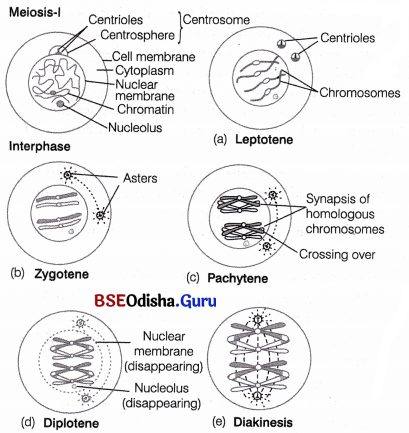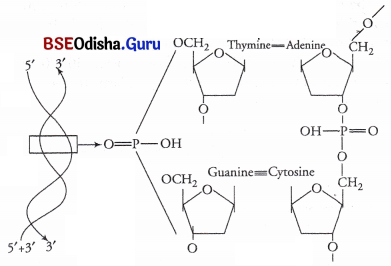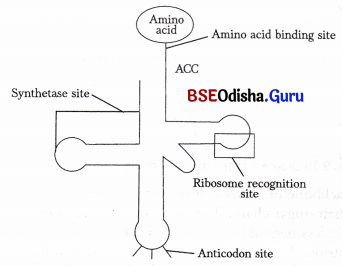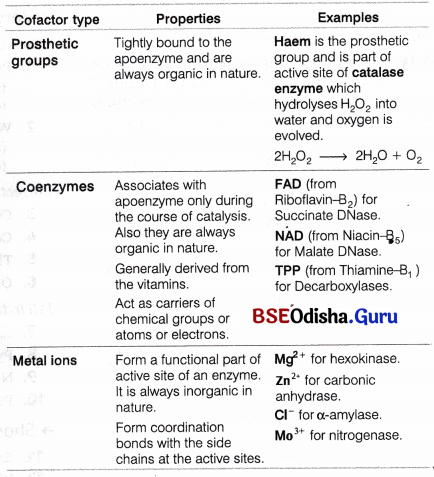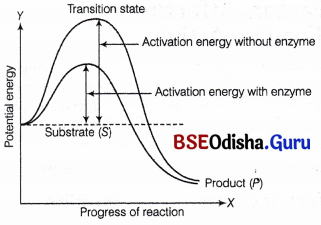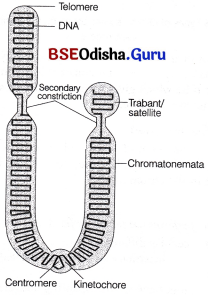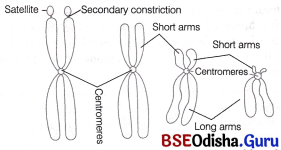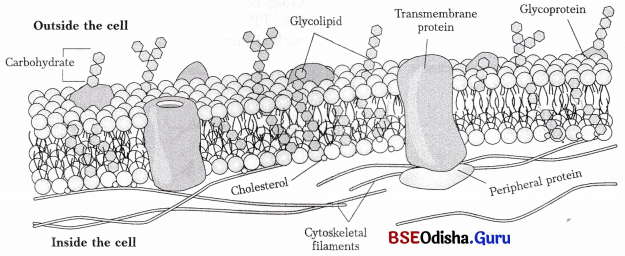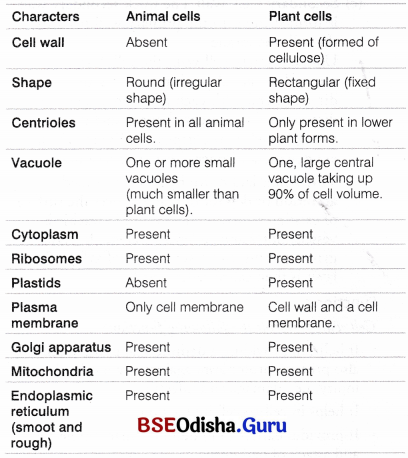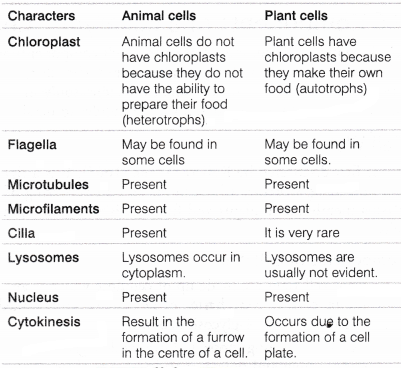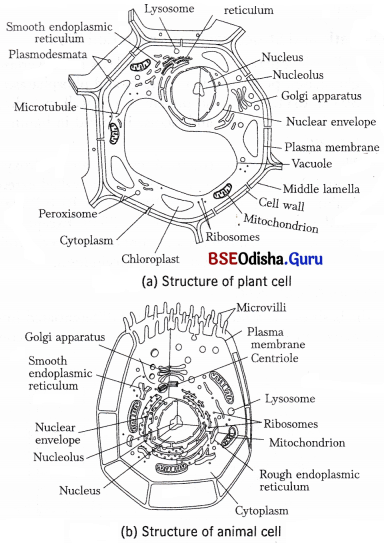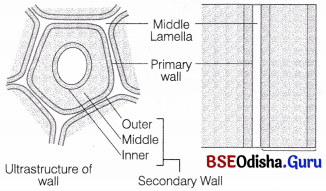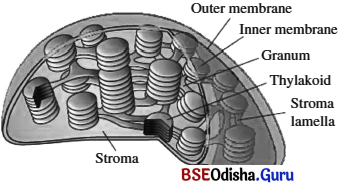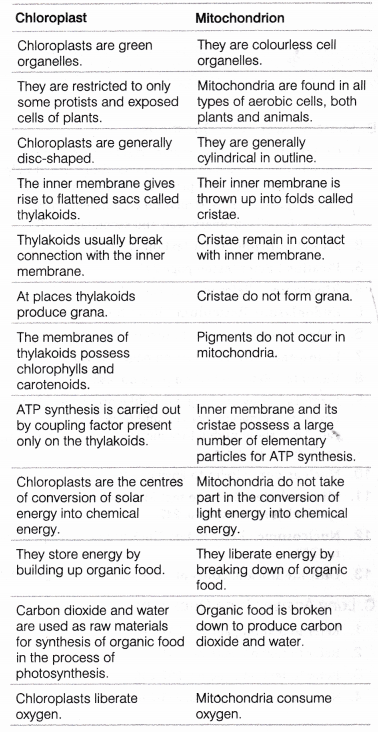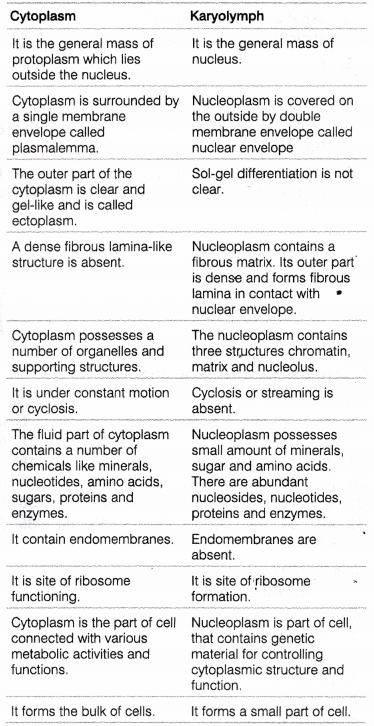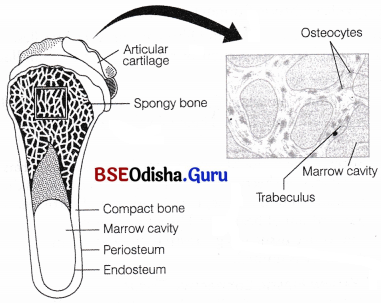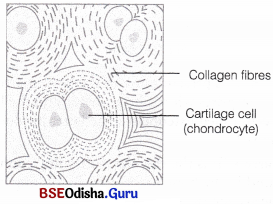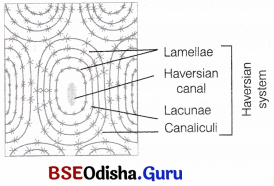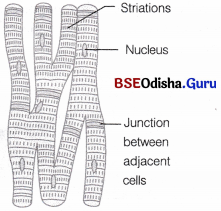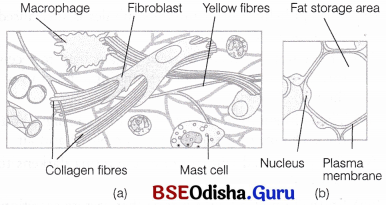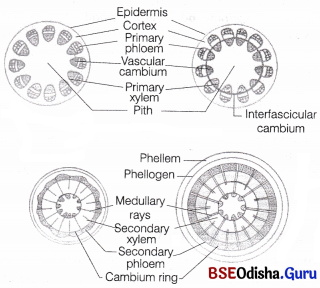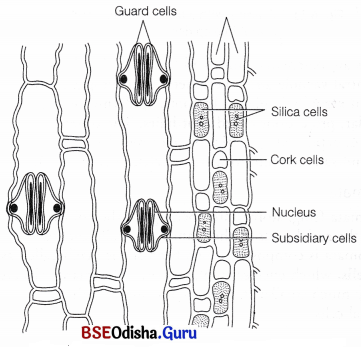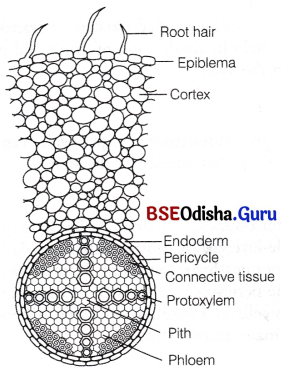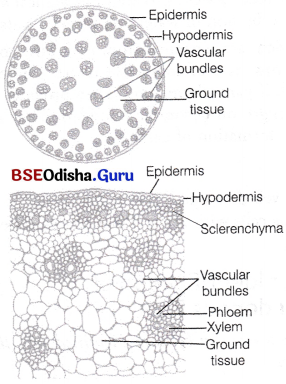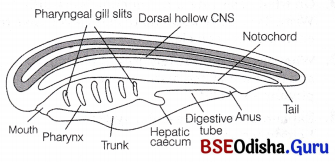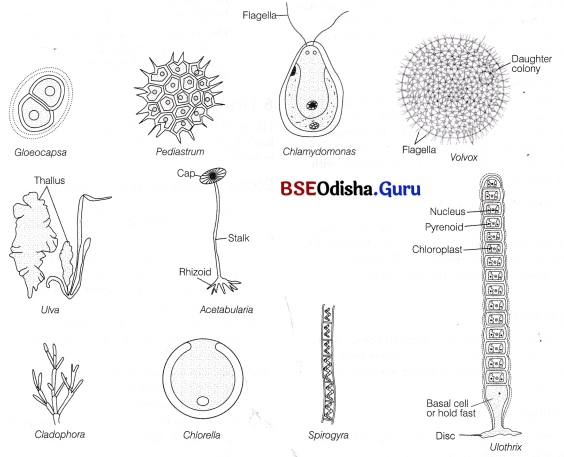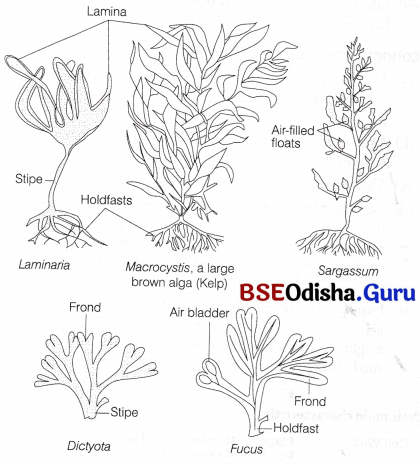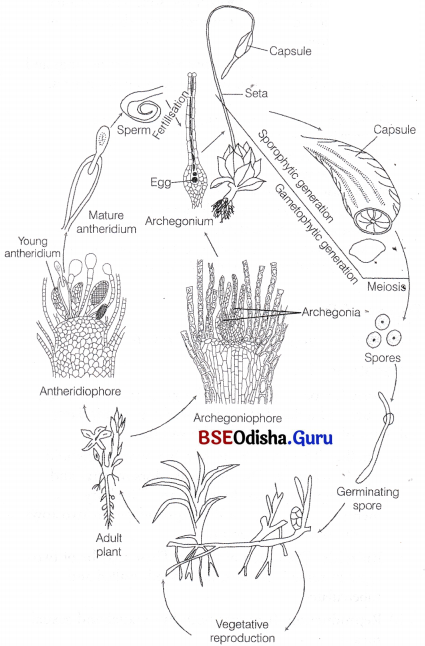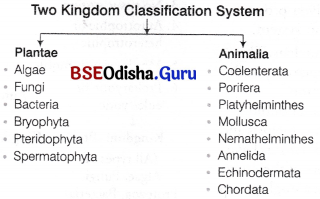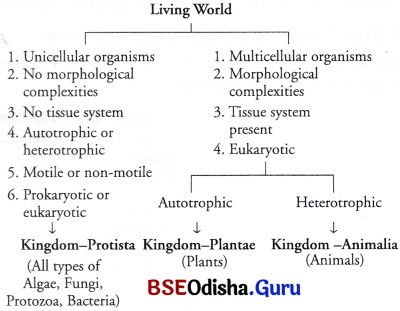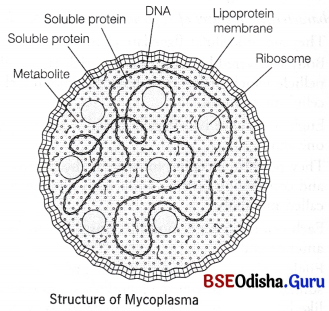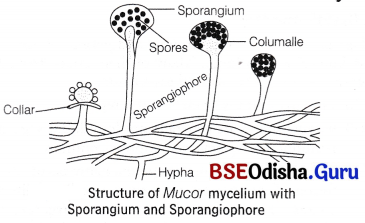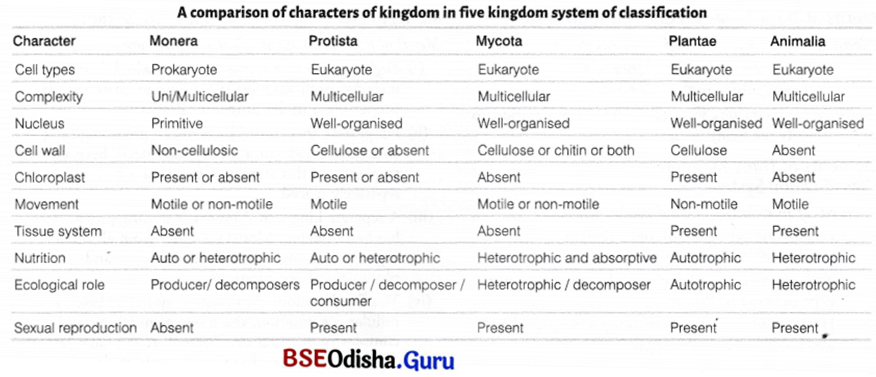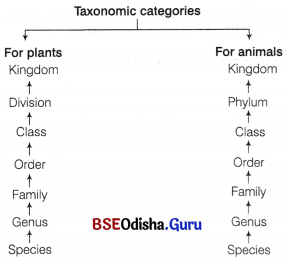Odisha State Board CHSE Odisha Class 11 Biology Solutions Chapter 11 Transport in Plants Textbook Questions and Answers.
CHSE Odisha 11th Class Biology Chapter 11 Question Answer Transport in Plants
Transport in Plants Class 11 Questions and Answers CHSE Odisha
Very Short Answer Type Questions
Choose the correct answer
Question 1.
When a cell becomes fully turgid being kept in water for sometime, which of its osmotic components becomes zero?
(a) OP
(b) TP
(c) Osmotic potential
(d) Pressure potential
Answer:
(b) TP
Question 2.
When a cell becomes flaccid being kept in a solution for sometime, then
(a) Pressure potential = zero
(b) Osmotic potential = zero
(c) Water potential = Pressure potential
(d) Pressure potential = Osmotic potential
Answer:
(a) Pressure potential = zero
Question 3.
When sucrose is dissolved in water, its water potential
(a) increases
(b) decreases
(c) becomes zero
(d) is not affected
Answer:
(b) decreases
Question 4.
If a cell is placed in hypertonic solution, what will happen?
(a) Endosmosis
(b) Exosmosis
(c) Deplasmolysis
(d) None of these
Answer:
(b) Exosmosis
Question 5.
If a cell volume decreases when placed in 0. 254 M sucrose solution, then the cell sap concentration is
(a) Equal to 0.25 M
(b) Less than 0.25 M
(c) More than 0.25 M
(d) Unpredictable
Answer:
(b) Less than 0.25 M
Question 6.
Root pressure is maximum when
(a) Absorption of water is high and rate of % transpiration is high
(b) Absorption of water is low and rate of transpiration is low
(c) Absorption of water is high and rate of transpiration is low
(d) Absorption of water is low and rate of transpiration is high
Answer:
(c) Absorption of water is high and rate of transpiration is low
Question 7.
When starch is converted to glucose in guard cells, their water potential
(a) increases
(b) decreases
(c) becomes zero
(d) is not affected
Answer:
(b) decreases
Question 8.
Ascent of sap in plants takes place through
(a) xylem
(b) phloem
(c) cambium
(d) Both xylem and cambium
Answer:
(b) xylem
Question 9.
Ascent of sap in tall tree is best explained by
(a) root pressure
(b) cohesion-tension theory
(c) capillary force
(d) imbibition
Answer:
(b) cohesion-tension theory
Question 10.
Which one is associated with stomatal regulation in plants?
(a) K+
(b) Na+
(c) Mg+
(d) PO–4
Answer:
(a) K+
Fill in the blanks
Question 1.
Stomata opens when guard cells become ……………. .
Answer:
turgid
Question 2.
Water potential of leaves are ………….. than that of roots during active transpiration.
Answer:
lower
Question 3.
Cohesion-tension theory of ascent of sap was proposed by …………… .
Answer:
Dixon and Jolly
Question 4.
The water coming out through hydathode contains ……………. .
Answer:
organic and inorganic salts
Question 5.
Pulsation theory of ascent of sap was advocated by ………………… .
Answer:
Sir JC Bose
Question 6.
In a flaccid cell, ψ = …………… .
Answer:
Solute potential
Question 7.
Water potential of pure water is taken as ……………… .
Answer:
zero
Question 8.
The density of a substance (d) is related to its rate of diffusion (r) by the relation, r = …………. .
Answer:
r = \(\frac{1}{\sqrt{4d}}\)
Question 9.
A plant cell placed in water reaches its maximum volume when its ψs =
Answer:
0
Question 10.
If ψs of a solution kept in a beaker is – 0.5 MPa, then its ψ =
Answer:
-0.5
Short Answer Type Questions
Question 1.
Symplast
Answer:
This system includes the living part of the plant cells made up of interconnected protoplasts’of neighbouring cells and connected through cytoplasmic strands extending through plasmodesmata.
The water that enters into the cell sap of root hair as a result of active absorption, moves into the underlying cortex cells bounded by a continuous selectively permeable membrane through plasmodesmata.
The movement in this pathway is relatively slower (as, water enters the cells through the cell membrane). The movement is again down the potential gradient and is aided by cytoplasmic streaming, which helps in quicker movement across individual cells. Thus, facilitating the transport.
It is generally believed that both apoplast and symplast v pathways are operative in plants, but apoplast pathway offers less or no resistance. Thus, water continues to move through apoplast in the roots.
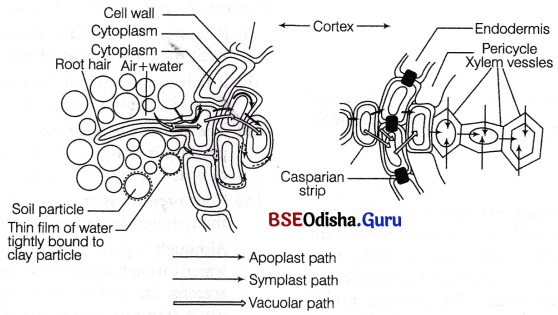
Question 2.
Apoplast
Answer:
Apoplast is the system of adjacent cell walls (i.e., interconnecting cell walls, intercellular spaces, cell wall of endodermis) that occurs continuously throughout the plant, except at the casparian strips of endodermis in roots. In this pathway, the movement of water molecules takes place through intercellular spaces and the walls of cells only.
The water movement takes place along the gradient from root hairs to xylem through the walls of intervening cells without crossing any membrane or cytoplasm.Thus, it does not provide any barrier to the movement of water, which occurs through mass flow due to adhesion and cohesion of water molecules. There is no involvement of osmosis in the apoplast pathway.
Question 3.
Root pressure
Answer:
It is believed that all plants absorb excess of water by an active process and tends to build up a positive hydrostatic pressure within the root system called root pressure. Due to this activity, the water is pushed upward along the length of the stem to a small height. The pressure inside the xylem is caused due to diffusion pressure gradient and is maintained by the activity of living cells.
Question 4.
Transpirational pull
Answer:
Plants themselves have a continuous water column in their xylem channels that starts at the base, (i.e. roots) and continues upto leaves from where water is lost through the process of transpiration. Thus, despite the absence of a circulatory system in plants, the flow of water upward through the xylem in plants achieves fairly high rates i.e. upto 15 metres per hour.
The water molecules in the water column remain attracted by the cohesive force and cannot be separated easily from one another. Thus, there is attraction between water molecules and the inner wall of xylem ducts due to which the water column cannot be pulled away from the walls of xylem ducts due to strong adhesive and cohesive forces. Hence, maintaining the continuity of water column from roots to leaves.
Water is lost from mesophyll cells to the intercellular spaces as a result of transpiration which develops a strong negative water potential. There are very large number of leaves and each leaf has thousands of transpiring mesophyll cells, which withdraws water from the xylem. This leads to a negative pressure in the water column, which exerts an upward pull over the water column. The xylem elements of roots) now moves upward under the influence of transpirational pull.
Thus, the cohesive, adhesive forces and transpiration pull all together help in lifting up of water through xylem elements and because of the critical role of cohesion the transpiration pull is also called cohesion-tension transpiration pull model of water transport.
Question 5.
Mechanics of stomatal opening
Answer:
Opening of Stomata
During this phenomenon, turgidity within guard cells increases due to endosmosis flanking each stomatal aperture or pore. Then, the thin outer walls stretch and bulge out. Pulling apart the opposite inner thick walls from each other (inner walls form a crescent shape) thereby, creating a pore or an opening in guard cells of stomata. Hence, making stomata to get open.
Question 6.
Significance of transpiration
Answer:
Transpiration is necessary and vital process. Various advantages are given below
- Helps in maintaining shape and structure of the plants by keeping cells turgid.
- It helps in regulation of temperature and cooling effect, i.e. cool leaf surfaces upto 10-15°C sometimes by evaporative cooling.
- It helps in supplying water for the process of photosynthesis.
- Helps in ascent of sap, (i.e. creates transpiration pull for absorption and transport of plants).
Question 7.
Hydathode
Answer:
Hydathodes A hydathode is an opening along the leaf margin that is able to release water. Hydathodes are absent from the rhizome, from the part of stem invested by leaves and from the inner surfaces of leaf sheaths, but they are found in all other aerial parts except the flower. Hydathodes release water in a process called guttation.
Question 8.
Stomata
Answer:
It is already known that plants do not utilise the total amount of water absorbed by them, out of total 100% of water, only 5-10% is utilised. Rest 90-95% of water is lost through transpiration from the aerial parts of plants (mainly from leaves) in the form of water vapours. The process of transpiration is carried out by the special structures found in leaves of plants called stomata.
Question 9.
Diffusion
Answer:
It is a physical process in which different solvent molecules or solute ions are transported passively without the expenditure of energy. It is a slow process and is independent of living system. During this process, the molecules or ions (be it a gas, liquid or solids) flow in a random fashion from the region of higher concentration to region of lower concentration.
Rate of diffusion is mainly affected by the following factors
- Concentration gradient of diffusing substance.
- Permeability of the membrane separating them.
- Temperature
- Pressure
- Density
Diffusion process is an important phenomenon in plants as it is the only means of transport of gases and materials in them.
Question 10.
Imbibition
Answer:
It is a special type of diffusion in which water is adsorbed by the solid particles (colloids) of a substance. The water molecules get tightly adsorbed at the surface of molecules/substances and become immobilised. This leads them to increase enormously in volume.
The solid particles which imbibe water or any other liquid are called imbibants. While, the liquid, which is imbibed is known as imbibate. The process of imbibition is also known as a type of diffusion because in this the movement of water occurs along the concentration gradient.
Imbibition can be best explained and seen in absorption of water by seeds and dry wood which act as absorbents to imbibe water and swell.
Question 11.
Water potential
Answer:
All living organisms require energy for their growth, to maintain metabolism and to reproduce. As water molecules possess kinetic energy, they are always in random motion (in both liquid and gaseous form) which is rapid and constant.
Water potential is the difference between the free energy of water molecules in pure water and the energy of water in any other system. It is denoted by \j/(psi) and expressed in pressure unit i.e. pascals (Pa).
Question 12.
DPD
Answer:
Diffusion Pressure Deficit (DPD) or Suction Pressure (SP)
The term ‘Diffusion Pressure Deficit’ (DPD) was coined by BS Meyer in 1938. The amount by which diffusion pressure of a solution is lower than that of its pure solvent is known as diffusion pressure deficit.
DPD = OP – TP
Fully turgid cell OP = TP
DPD = O
Fully flaccid cell TP = O
DPD = OP
The DPD of any cell is the measure of water absorbing capacity of that cell. It is also called as suction pressure. Thus, suction pressure is a measure of the ability of a cell to absorb water.
Question 13.
Turgor pressure
Answer:
It is the hydrostatic pressure exerted by the cell contents against the cell wall due to the osmotic entry of water. It is variable as TP is maximum when the cell is fully turgid, and is zero when the cell is flaccid.
In a turgid cell, the walls of cell exert an equal and opposite pressure in response to Turgor Pressure (TP).
This is called as Wall Pressure (WP). So, TP = WP.
Long Answer Type Questions
Question 1.
Describe the mechanism of water absorption by plant roots.
Answer:
Mechanism of Water Absorption
It takes place by two methods
1. Active Absorption of Water
Two theories have been put forward to explain active absorption of water these are
(i) Osmotic Theory According to this theory, water moves from soil to root hairs by means of diffusion along a gradient of decreasing water potential (ψ). Root hair cells and xylem sap has lower water potential than the soil solution. So, water moves from soil to the root xylem by cell to cell osmosis.
(ii) Non-osmotic Theory According to this theory, water is absorbed by the root cells even if the soil water potential is lower than the cell sap. It is supported by the following facts
- There exist a relation between rate of respiration and absorption of water.
- Factors affecting rate of respiration also affect absorption of water.
- There exists an auxin induced water uptake.
2. Passive Absorption of Water
According to this theory, the main driving force for water absorption is the transpiration pull.
This pulls water from soil through root hairs and then from xylem column of roots and stems.
Water in plants is considered as continuous hydraulic system, connecting water in soil and water vapours in the atmosphere surrounding the plants.
In the passive absorption of water, the rate of absorption of water by plants is approximately equal to the rate of transpiration, provided water is available in optimum quantity .in the soil.
In general, all plants absorb water through roots. However, the area of young roots where most absorption of water and minerals takes place is called the root hair zone. The root hairs are thin-walled, slender extension of root epidermal cell found at the tip of roots in millions. These are very delicate structures, which do not last for more than days or a week. They also have very sticky walls that help in tight adhesion to the soil particles.
Question 2.
Describe the factors affecting water absorption by plant roots.
Answer:
Factors Affecting Absorption of Water
The rate of absorption of water is affected by
1. External environmental factors like soil, temperature, soil aeration, concentration of soil solution and availability of water in the soil, affect the rate of absorption of water.
2. Internal factors include metabolism of root system, (including number of root hairs, etc.) and the rate of transpiration.
Question 3.
Describe the transpirational pull and cohesion-tension theory of ascent of sap.
Answer:
Transpiration Pull and Cohesion-Tension Theory
Plants themselves have a continuous water column in their xylem channels that starts at the base, (i.e. roots) and continues upto leaves from where water is lost through the process of transpiration. Thus, despite the absence of a circulatory system in plants, the flow of water upward through the xylem in plants achieves fairly high rates i.e. upto 15 metres per hour.
The water molecules in the water column remain attracted by the cohesive force and cannot be separated easily from one another. Thus, there is attraction between water molecules and the inner wall of xylem ducts due to which the water column cannot be pulled away from the walls of xylem ducts due to strong adhesive and cohesive !* forces. Hence, maintaining the continuity of water column from roots to leaves.
Water is lost from mesophyll cells to the intercellular spaces as a result of transpiration which develops a strong negative water potential. There are very large number of leaves and each leaf has thousands of transpiring mesophyll cells, which withdraws water from the xylem. This leads to a negative pressure in the water column, which exerts an upward pull over the water column. The xylem elements of roots) now moves upward under the influence of transpirational pull.
Thus, the cohesive, adhesive forces and transpiration pull all together help in lifting up of water through xylem elements and because of the critical role of cohesion the transpiration pull is also called cohesion-tension transpiration pull model of water transport.
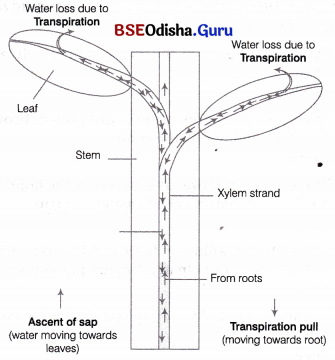
Transpiration pull (tension) and ascent of sap
Question 4.
Write how potassium ions regulate the opening and closing of stomatal pore.
Answer:
Malate or K+ Ion Pump Theory
The main features of this theory were put forward by Levitt (1974). This is also known as modern theory. According to this, there is accumulation of K+ ions in the guard cells during stomatal opening. And the influx of K+ into the guard cells is accompained by the synthesis of malic acid (an organic acid).
Differences occurring during day and night
Tablee
Question 5.
Describe the factors affecting the transpiration in plants.
Answer:
Factors Affecting Transpiration
There are several external and internal factors that affect the rate of transpiration in many ways.
Some of them are given below
(i) External Factors
These include the factors that influence the rate of transpiration (such as temperature, light, humidity and speed of wind).
(ii) Internal (Plant) Factors
These include the factors that are other than the physical factors such as number of stomata, distribution of stomata, per cent of open stomata, water status of plant and canopy structure.
Question 6.
What do you mean by water potential? Describe its components.
Answer:
Components of Water Potential
The water potential (ψw) of a living cell has three major components such as solute potential (ψs) or osmotic potential, pressure potential (ψp) and matric potential (ψm). Water potential is actually the sum of all above three potentials. N
Water potential ψ = ψm + ψs + ψp
1. Solute Potential
The amount by which the water potential is reduced as a result of the presence of a solute in pure water is known as solute potential. It is also known as osmotic potential.
Solute potential is denoted by ψs and are always in negative values (or has value less than zero). Hence,
More number of solute molecules
= Lower solute potential (more — ve).
At atmospheric pressure for a solution,
ψw(Water potential) = ψs(Solute potential)
2. Pressure Potential
If a pressure more than atmospheric pressure is applied to pure water or a solution containing solute, the water potential increases. This is equal to pumping water from one place to another, e.g. our heart build up pressure for the circulation of blood in the body.
When water enters a plant cell through diffusion, it becomes turgid due to building up of pressure against the cell wall in a plant system. This leads to increase in the pressure potential. It is usually positive in nature and hence, known as a turgor pressure (denoted by ψp). Loss of water during transpiration produces a negative hydrostatic pressure or tension in the; xylem. This is very important in transport (ascent of sap) over long distances in plants. The water potential of any systems is thus, affected by both solute and pressure potential.
i.e., ψw = ψs + ψp
3. Matric Potential(ψm)
It is a component of water potential due to the adhesion of water molecules to non-dissolved structures of the system, i.e. the matrix, such as plasma membranes. It is represented by ψm. It is always negative and is significant only outside living cells in relatively dry system, e.g. soils.
Question 7.
Describe the relationship between DPD, OP and TP of a cell.
Answer:
The term ‘Diffusion Pressure Deficit’ (DPD) was coined by BS Meyer in 1938. The amount by which diffusion pressure of a solution is lower than that of its pure solvent is known as diffusion pressure deficit.
DPD = OP – TP
Fully turgid cell OP = TP
DPD = O
Fully flaccid cell TP = O
DPD = OP
The DPD of any cell is the measure of water absorbing capacity of that cell. It is also called as suction pressure. Thus, suction pressure is a measure of the ability of a cell to absorb water.
Question 8.
Give an account of diffusion.
Answer:
It is a physical process in which different solvent molecules or solute ions are transported passively without the expenditure of energy. It is a slow process and is independent of living system. During this process, the molecules or ions (be it a gas, liquid or solids) flow in a random fashion from the region of higher concentration to region of lower concentration.
Rate of diffusion is mainly affected by the following factors
- Concentration gradient of diffusing substance.
- Permeability of the membrane separating them.
- Temperature
- Pressure
- Density
Diffusion process is an important phenomenon in plants as it is the only means of transport of gases and materials in them.

